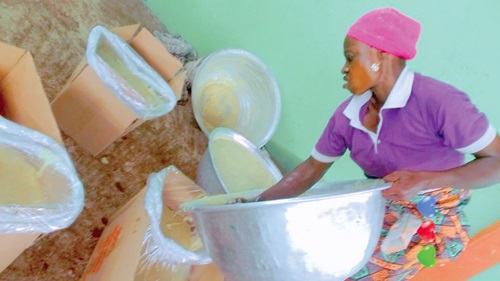
Empowering women in Sorugu: Shea butter production thrives
A lot of women have found economic empowerment through shea butter production in Sorugu, a farming community located in the Sagnarigu Municipal District of the Northern Region.
This thriving local occupation is the mainstay of the community, with two shea butter processing factories operating in the area.
The women of Sorugu skilfully transform shea nuts into high-quality shea butter, which is then sold to factory buyers. This enterprise has not only provided a source of income but also fostered a sense of community and cooperation among the women.
Sorugu, with less than 250 houses, stands out as the only community in the municipality with two shea butter processing factories, making it a hub of shea butter production.
The success of this industry has positively impacted the local economy and improved the livelihoods of the women involved.
Through their hard work and dedication, the women of Sorugu are setting an example for entrepreneurship and self-sufficiency, demonstrating the potential for rural communities to drive economic growth and development.
The most popular place for production is the processing factory. However, a few women do the processing in their various homes and sell to the factory and individuals.
The women usually pick the shea nuts from their husbands’ farms during the rainy season and resort to market places that are close to them like Tamale, Kumbungu, Savelugu, and Tolon to buy the Shea nuts during the dry season and sometimes the factory owners provide the women with the nuts.
Source of income
Shea butter production serves as an income generation venture for both genders, especially women in the Northern Region where a lot of shea trees can be found.
According to Sanatu Iddrisu, she has been in this business for the past 10 years and has benefited a lot which she uses to support her husband in taking care of their children.
"After the death of my husband, I have been using the money I get from producing shea butter to feed my five children and take care of their basic needs," Meli Issahaku also stated.
Alhassan Zakia, another processor, also added that through the production she can afford some income to pay for her tertiary education.
"Without this factory, I wouldn't have been able to afford education. Now I am even the secretary of this factory, so I have benefitted a lot," she said.
Health
Speaking to the Technical Officer of Nutrition at the Gbullung Health Centre, Nurudeen Hudu, he said shea butter protected the skin from free radicals leading to dull skin, and vital for brain functioning and good vision, and is also good for improving eyesight.
"It reduces bad cholesterol and the risk of heart disease and stroke; high intake of fat can lead to weight gain which is detrimental to human health, she stated," he said.
He added that it had anti-inflammatory properties to slow the production of inflammatory cells and it helps to reduce skin irritation caused by dry weather and other inflammatory skin conditions such as eczema and dermatitis. It helps in wound healing.
Mr Hudu indicated that it was anti-bacterial which helps the hair follicle epithelium to fight against bacteria when applied to the hair. It also helps to moisturise and decrease breakage, dandruff and dry scalp. Shea butter, he added, contained a lot of nutrients that could improve human health.
Challenges
The major products of Shea butter, according to the Chief Executive Officer of Asheba Shea Butter Processing Factory, Fuseini Ayisha, are body cream, hair pomade, baby cream, soap, black soap among others. She sells to local buyers and at times foreigners.
She, however, said shea butter processing factory owners faced a lot of challenges after processing the nut into shea butter, adding that getting the right prices for the goods was difficult, making some of them run into loss due to the increment in the price of shea nut and other raw materials.
Also, she said exporting the finished products has been a major issue affecting producers as they find it difficult to export it outside the country.
“Large quantities of shea butter are produced and some are used to manufacture local products while the rest are left because there is low patronage of the products in the local market,” she added.
Ms Ayisha also lamented the lack of capital to expand the processing factories. She also bemoaned the loss of economic trees to bushfire and called on foreign buyers to patronise the finished shea butter.
